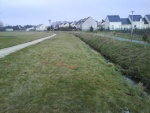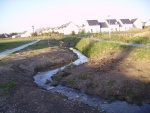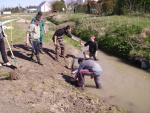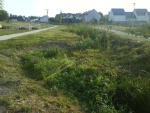Case study:Remeandering of the Mardereau stream at Sorigny
Project overview
| Status | Complete |
|---|---|
| Project web site | |
| Themes | Flood risk management, Habitat and biodiversity, Hydromorphology, Social benefits, Water quality |
| Country | France |
| Main contact forename | David |
| Main contact surname | Laurendeau |
| Main contact user ID | |
| Contact organisation | Syndicat intercommunal d’aménagement de la vallée de l’Indre (SAVI) |
| Contact organisation web site | |
| Partner organisations | |
| Parent multi-site project | |
| This is a parent project encompassing the following projects |
No |
Project summary
The Mardereau stream is a small tributary of the Indre river. The catchment is dominated by crops and the intensification of agricultural pressures since 1941 has resulted in the creation of an extensive drainage network of and the disappearance of wetland habitats. Soil sealing in the watershed is increasing due to the proximity of the town of Tours. As a result the flood risk management issue is very relevant. At Sorigny the Mardereau was straightened, dredged and, in the upstream part, cemented.
Under the leadership of the Syndicat Intercommunal d’Aménagement de la Vallée de l’Indre (SAVI), a pilot restoration project has been realized. Works carried out included remeandering and plantation of riparian vegetation, together with some local biongeneering measures.
Monitoring surveys and results
Lessons learnt
Image gallery
|
Catchment and subcatchmentSelect a catchment/subcatchment
Catchment
Subcatchment
Site
Project background
Cost for project phases
Reasons for river restoration
Measures
MonitoringHydromorphological quality elements
Biological quality elements
Physico-chemical quality elements
Any other monitoring, e.g. social, economic
Monitoring documents
Additional documents and videos
Additional links and references
Supplementary InformationEdit Supplementary Information
| |||||||||||||||||||||||||||||||||||||||||||||||||||||||||||||||||||||||||||||||||||||||||||||||||||||||||||||||||||||||||||||||||||||||||||||||||||||||||||||||||||||||||||||||||||||||||||||||||||||||||||||||||||||||||||||




